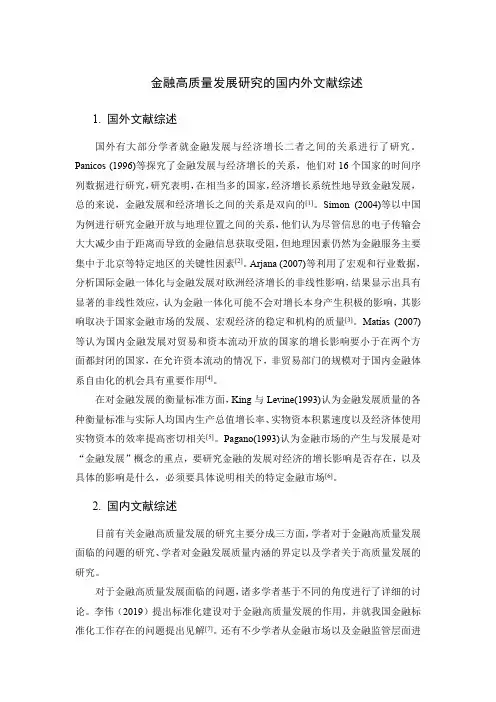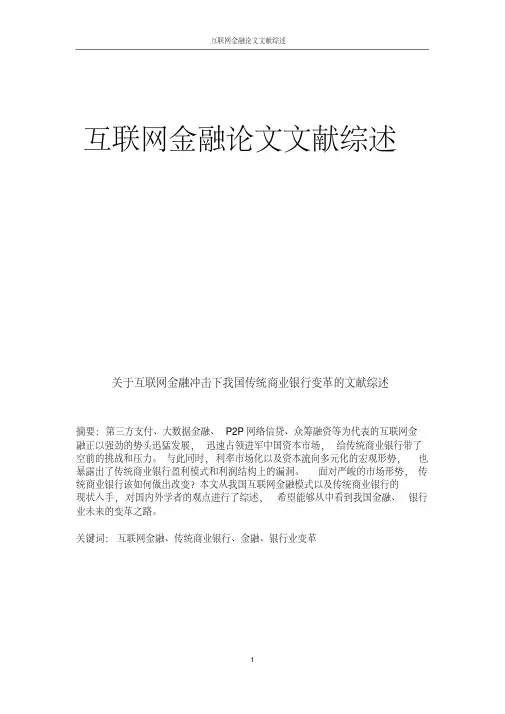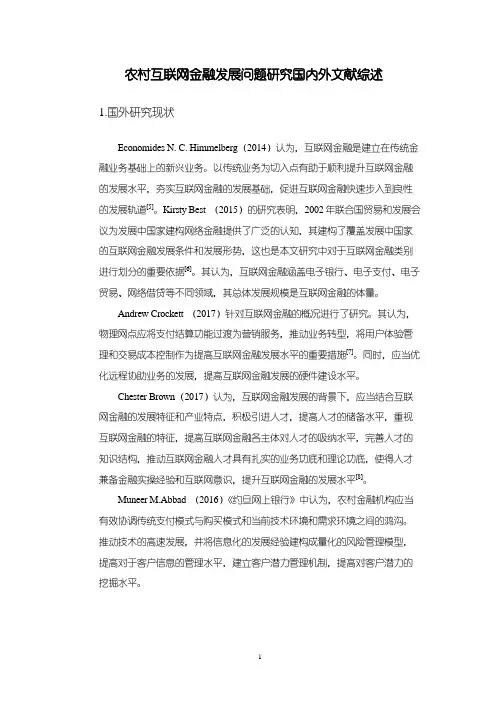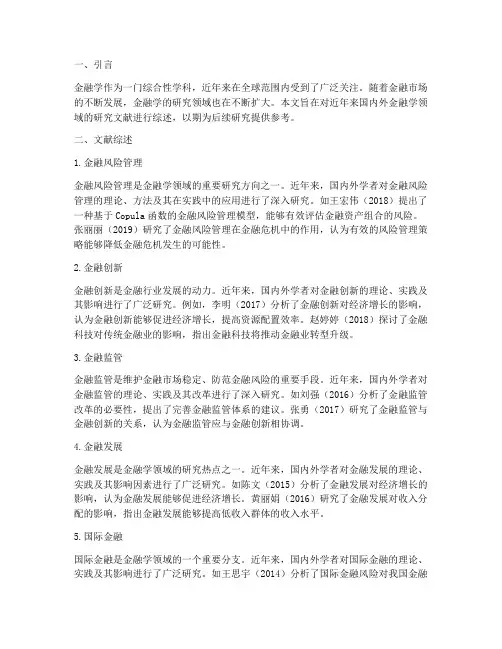互联网金融发展文献综述及外文文献资料P2P金融
《金融高质量发展研究的文献综述3300字》

金融高质量发展研究的国内外文献综述1. 国外文献综述国外有大部分学者就金融发展与经济增长二者之间的关系进行了研究。
Panicos (1996)等探究了金融发展与经济增长的关系,他们对16个国家的时间序列数据进行研究,研究表明,在相当多的国家,经济增长系统性地导致金融发展,总的来说,金融发展和经济增长之间的关系是双向的[1]。
Simon (2004)等以中国为例进行研究金融开放与地理位置之间的关系,他们认为尽管信息的电子传输会大大减少由于距离而导致的金融信息获取受阻,但地理因素仍然为金融服务主要集中于北京等特定地区的关键性因素[2]。
Arjana (2007)等利用了宏观和行业数据,分析国际金融一体化与金融发展对欧洲经济增长的非线性影响,结果显示出具有显著的非线性效应,认为金融一体化可能不会对增长本身产生积极的影响,其影响取决于国家金融市场的发展、宏观经济的稳定和机构的质量[3]。
Matías (2007)等认为国内金融发展对贸易和资本流动开放的国家的增长影响要小于在两个方面都封闭的国家,在允许资本流动的情况下,非贸易部门的规模对于国内金融体系自由化的机会具有重要作用[4]。
在对金融发展的衡量标准方面,King与Levine(1993)认为金融发展质量的各种衡量标准与实际人均国内生产总值增长率、实物资本积累速度以及经济体使用实物资本的效率提高密切相关[5]。
Pagano(1993)认为金融市场的产生与发展是对“金融发展”概念的重点,要研究金融的发展对经济的增长影响是否存在,以及具体的影响是什么,必须要具体说明相关的特定金融市场[6]。
2. 国内文献综述目前有关金融高质量发展的研究主要分成三方面,学者对于金融高质量发展面临的问题的研究、学者对金融发展质量内涵的界定以及学者关于高质量发展的研究。
对于金融高质量发展面临的问题,诸多学者基于不同的角度进行了详细的讨论。
李伟(2019)提出标准化建设对于金融高质量发展的作用,并就我国金融标准化工作存在的问题提出见解[7]。
互联网金融论文文献综述

互联网金融论文文献综述关于互联网金融冲击下我国传统商业银行变革的文献综述摘要:第三方支付、大数据金融、P2P 网络信贷、众筹融资等为代表的互联网金融正以强劲的势头迅猛发展,迅速占领进军中国资本市场,给传统商业银行带了空前的挑战和压力。
与此同时,利率市场化以及资本流向多元化的宏观形势,也暴露出了传统商业银行盈利模式和利润结构上的漏洞。
面对严峻的市场形势,传统商业银行该如何做出改变?本文从我国互联网金融模式以及传统商业银行的现状入手,对国内外学者的观点进行了综述,希望能够从中看到我国金融、银行业未来的变革之路。
关键词:互联网金融、传统商业银行、金融、银行业变革随着现代信息科技日新月异的发展,科技与金融的结合日趋深化,作为现代信息科技金融应用主力军的互联网金融已经以其势如破竹的姿态对传统金融机构产生重大影响。
互联网与金融的深度碰撞、现代信息科技与金融的渗透融合已成为现代金融业不可逆转的发展趋势。
以互联网为代表的现代信息技术,正在直接推动着传统银行业的深刻变革。
本文从我国互联网金融模式以及传统商业银行的现状入手,对国内外学者的观点进行了综述,希望能够从中看到我国传统银行业未来的变革方向。
一、关于互联网金融模式的研究谢平(2012)认为:“以互联网为代表的现代信息科技,特别是移动支付、社交网络、搜索引擎以及云计算等,将会对人类金融模式产生根本影响。
可能出现既不同于商业银行间接融资,也不同于资本市场直接融资的第三种融资,即‘互联网金融模式’”。
不得不说,互联网金融模式的确具有许多不同于传统金融的特征,同时也显示很强的创造性和竞争性。
能否据此断定互联网金融将给传统金融模式带来巨大冲击,甚至将对人类金融模式产生根本的影响呢?判断之前还是应该对互联网金融模式有更深层次的理解与研究。
(一)关于第三方支付的研究1、第三方支付的性质界定研究对于第三方支付理论研究的时间晚于市场的发育,关于第三方支付的性质界定,学术界争议较大。
《农村互联网金融发展问题探究国内外文献综述2400字》

农村互联网金融发展问题研究国内外文献综述1.国外研究现状Economides N. C. Himmelberg(2014)认为,互联网金融是建立在传统金融业务基础上的新兴业务。
以传统业务为切入点有助于顺利提升互联网金融的发展水平,夯实互联网金融的发展基础,促进互联网金融快速步入到良性的发展轨道[5]。
Kirsty Best (2015)的研究表明,2002年联合国贸易和发展会议为发展中国家建构网络金融提供了广泛的认知,其建构了覆盖发展中国家的互联网金融发展条件和发展形势,这也是本文研究中对于互联网金融类别进行划分的重要依据[6]。
其认为,互联网金融涵盖电子银行、电子支付、电子贸易、网络借贷等不同领域,其总体发展规模是互联网金融的体量。
Andrew Crockett (2017)针对互联网金融的概况进行了研究。
其认为,物理网点应将支付结算功能过渡为营销服务,推动业务转型,将用户体验管理和交易成本控制作为提高互联网金融发展水平的重要措施[7]。
同时,应当优化远程协助业务的发展,提高互联网金融发展的硬件建设水平。
Chester Brown(2017)认为,互联网金融发展的背景下,应当结合互联网金融的发展特征和产业特点,积极引进人才,提高人才的储备水平,重视互联网金融的特征,提高互联网金融各主体对人才的吸纳水平,完善人才的知识结构,推动互联网金融人才具有扎实的业务功底和理论功底,使得人才兼备金融实操经验和互联网意识,提升互联网金融的发展水平[8]。
Muneer M.Abbad (2016)《约旦网上银行》中认为,农村金融机构应当有效协调传统支付模式与购买模式和当前技术环境和需求环境之间的鸿沟。
推动技术的高速发展,并将信息化的发展经验建构成量化的风险管理模型,提高对于客户信息的管理水平,建立客户潜力管理机制,提高对客户潜力的挖掘水平。
2.国内研究现状第一,农村互联网金融研究方面。
姜颖(2016)针对农村互联网金融工具进行了研究,将农村金融工具划分为投资、储蓄、信贷、结算、证券买卖、商业保险等类别的基础上,诠释了农村金融工具的功能。
金融文献综述范文

一、引言金融学作为一门综合性学科,近年来在全球范围内受到了广泛关注。
随着金融市场的不断发展,金融学的研究领域也在不断扩大。
本文旨在对近年来国内外金融学领域的研究文献进行综述,以期为后续研究提供参考。
二、文献综述1.金融风险管理金融风险管理是金融学领域的重要研究方向之一。
近年来,国内外学者对金融风险管理的理论、方法及其在实践中的应用进行了深入研究。
如王宏伟(2018)提出了一种基于Copula函数的金融风险管理模型,能够有效评估金融资产组合的风险。
张丽丽(2019)研究了金融风险管理在金融危机中的作用,认为有效的风险管理策略能够降低金融危机发生的可能性。
2.金融创新金融创新是金融行业发展的动力。
近年来,国内外学者对金融创新的理论、实践及其影响进行了广泛研究。
例如,李明(2017)分析了金融创新对经济增长的影响,认为金融创新能够促进经济增长,提高资源配置效率。
赵婷婷(2018)探讨了金融科技对传统金融业的影响,指出金融科技将推动金融业转型升级。
3.金融监管金融监管是维护金融市场稳定、防范金融风险的重要手段。
近年来,国内外学者对金融监管的理论、实践及其改革进行了深入研究。
如刘强(2016)分析了金融监管改革的必要性,提出了完善金融监管体系的建议。
张勇(2017)研究了金融监管与金融创新的关系,认为金融监管应与金融创新相协调。
4.金融发展金融发展是金融学领域的研究热点之一。
近年来,国内外学者对金融发展的理论、实践及其影响因素进行了广泛研究。
如陈文(2015)分析了金融发展对经济增长的影响,认为金融发展能够促进经济增长。
黄丽娟(2016)研究了金融发展对收入分配的影响,指出金融发展能够提高低收入群体的收入水平。
5.国际金融国际金融是金融学领域的一个重要分支。
近年来,国内外学者对国际金融的理论、实践及其影响进行了广泛研究。
如王思宇(2014)分析了国际金融风险对我国金融市场的影响,提出了防范国际金融风险的建议。
互联网金融研究文献综述

互联网金融研究文献综述互联网金融是指通过互联网技术与金融业务相结合,为用户提供便捷、高效的金融服务。
随着互联网技术的不断发展和普及,互联网金融已经成为金融行业的新兴领域,吸引了广泛的研究关注。
本文将对互联网金融研究文献进行综述,探讨互联网金融的发展趋势和影响。
首先,互联网金融研究关注的一个重要方向是互联网金融对金融业务的影响和变革。
一些研究表明,互联网金融的出现改变了传统金融业务的模式和运作方式。
互联网金融为金融机构提供了更便捷的渠道和更高效的服务,同时也为用户提供了更多元化的金融产品和更加个性化的金融服务。
这对传统金融机构提出了新的挑战,也为金融市场的竞争带来了新的压力。
其次,互联网金融的发展还引起了监管机构和政府的关注。
互联网金融的迅猛发展给金融市场带来了一系列风险和挑战,如信息安全风险、消费者权益保护、金融稳定等。
因此,监管机构和政府对互联网金融的监管和规范也成为研究的重要方向。
研究表明,有效的监管和规范可以促进互联网金融的健康发展,保护金融市场的稳定和公平。
另外,互联网金融还对金融创新和金融风险的研究提出了新的问题和挑战。
互联网金融的技术特点和业务模式创造了许多新的金融产品和业务,如在线支付、P2P借贷、互联网保险等。
这些金融创新为用户提供了更多样化的选择,也为金融机构带来了新的商机。
然而,互联网金融的风险也不容忽视,如信息安全风险、信用风险、道德风险等。
因此,研究如何在保持金融创新的同时,有效管理和控制金融风险成为互联网金融研究的一个重要问题。
最后,互联网金融的发展还带来了金融普惠和金融包容的话题。
互联网金融通过降低金融服务的门槛和成本,使更多的人能够享受到金融服务。
这对于发展中国家和贫困地区的人们来说,具有重要的意义。
因此,互联网金融的研究还关注如何通过互联网金融促进金融普惠和金融包容。
综上所述,互联网金融是一个新兴的研究领域,吸引了广泛的关注。
当前的研究主要集中在互联网金融对金融业务的影响和变革、互联网金融的监管和规范、互联网金融的金融创新和金融风险以及互联网金融的金融普惠和金融包容等方面。
互联网金融风险管理文献综述

互联网金融风险管理文献综述随着信息技术的飞速发展,互联网金融作为一种新兴的金融模式应运而生。
它以其便捷、高效、低成本等优势,为广大用户提供了丰富多样的金融服务。
然而,与此同时,互联网金融也面临着诸多风险,如信用风险、市场风险、操作风险、法律风险等。
为了更好地理解和应对这些风险,众多学者进行了深入的研究,并取得了丰硕的成果。
本文旨在对互联网金融风险管理的相关文献进行综述,以期为进一步的研究和实践提供参考。
一、互联网金融的特点及风险来源互联网金融具有以下显著特点:一是金融服务的数字化和虚拟化,使得交易过程更加便捷,但也增加了信息安全风险;二是金融服务的跨界融合,突破了传统金融的边界,导致风险传播更加迅速;三是金融服务的普惠性,扩大了金融服务的覆盖范围,但也带来了更多的信用风险。
互联网金融风险的来源主要包括以下几个方面:首先,技术层面的漏洞和缺陷,如网络攻击、数据泄露等,可能导致金融机构和用户遭受巨大损失;其次,信息不对称问题在互联网金融中依然存在,甚至可能更加严重,从而引发信用风险;再者,互联网金融的创新速度快,相关法律法规和监管制度相对滞后,容易产生法律风险;最后,市场的不确定性和金融市场的波动,也会给互联网金融带来市场风险。
二、互联网金融信用风险管理信用风险是互联网金融面临的主要风险之一。
许多学者研究了如何通过大数据分析、信用评估模型等手段来提高信用风险管理水平。
例如,一些研究利用社交网络数据、电商交易数据等多维度的信息,构建更加全面和准确的信用评估模型。
同时,也有学者探讨了如何建立有效的信用风险预警机制,及时发现潜在的信用风险。
三、互联网金融市场风险管理市场风险在互联网金融中同样不容忽视。
学者们关注的焦点包括如何利用金融衍生品进行风险对冲,如何通过资产组合优化来降低市场风险等。
此外,对于互联网金融市场的波动性和风险传染机制的研究也在不断深入。
四、互联网金融操作风险管理操作风险主要源于内部流程不完善、人员失误、系统故障等。
《互联网金融的发展研究国内外文献综述》2700字
互联网金融的发展研究国内外文献综述(一)国外研究概况随着新时代的到来,人们更加注重自己的想法,倾向于将个性和个人利益进行融合。
因为传统银行带来的服务并非完全没有变化的,所以无法满足不同人的不同需求。
金融产品比较多的时候会让人感觉杂乱无章,在这个过程中,需要为客户制定对应的产品策略。
Hsien Tang Tsai,Leo Huang,Qmng Gee Lin(2005)的观点是,每个年龄的群体对互联网金融发展的推动力在程度上是不同的。
其发展受人们对于计算机的使用熟练度以及对网络银行理解度的制约[1]。
Mark Gertler & Nobuhiro Kiyotaki(2011)的观点是在网络金融快速发展的时代背景下,科学技术及信息发生了巨大的变化,网络银行也只有跨行也行,网络银行的风险要比之前的金融风险更高,而且并不是受到市场价格波动。
这个单一因素的影响,还受到网络银行硬件设施,相关技术以及设备安全的综合作用[2]。
Dilip K. Patro & Min Qi & Xian SunS(2012)认为随着互联网金融的发展,网络银行的兴起,为金融业与其他行业的混合经营提供了一个较大的发展平台,这对目前的传统银行业经营模式产生了不小冲击,金融业的三驾马车:银行业、证券业、保险业之间,在互联网金融发展的推动下又产生了新的合作方式,而现有的法律法规框架体系存在一定的滞后性,对互联网金融快速发展下存在的一些问题没有顺手可用的应对措施,这就导致面临各种问题,金融行业的监管难度不断上升[3]。
(二)国内研究概况马仲康(2018)的观点是随着互联网走进千家万户,且用户数量的增加,为了满足客户多方面的需求,很多传统银行纷纷在网上开设自己的网络银行,这给用户带来了极大地便利,不用到银行也可以办理业务,在我看来比较满意的是跨行转账可以实时到账,并且没有手续费。
而且可以在网上银行进行理财。
虽然网上银行有很多优势,但由于其发展速度过快。
互联网金融研究文献综述
互联网金融研究文献综述互联网金融是互联网技术与传统金融相结合的新兴领域,互联网金融的出现,对传统金融机构带来了极大地冲击和挑战,商业银行更是不可避免地受到了全面性、系统性和持续性的影响。
宫晓林(2013)在讨论互联网金融模式的概念、特征和功能的基础上,总结了互联网金融在战略、客户渠道、融资、定价以及金融托媒等方面对商业银行的影响,并且分别短期和长期进行分析。
在短期内互联网金融尚不足以动摇商业银行的经营模式和盈利模式,但从长期来说,商业银行要寻求新的发展,必须大力发展互联网金融模式。
陈明昭(2013)通过对互联网金融主要商业模式的分析,从第三方支付、P2P网络贷款平台、大数据金融、信息化金融机构四个方面揭示其对商业银行发展的影响。
赵南岳(2013)分析了互联网金融的特征,深入地探讨了其对对银行业支付结算领域、金融产品销售领域、银行物理网点布设、服务方式变革等方面的冲击。
袁博、李永刚、张逸龙(2013)则认为互联网金融不仅是传统金融的有益补充,而且会推动我国的金融效率提升、交易结构和金融架构的深刻变革。
互联网金融对传统商业银行带来了“去中介化”“泛金融化”和“全智能化”的新挑战,商业银行需大力发展服务功能创新、服务渠道创新和平台模式创新以应对互联网金融的冲击和挑战。
参考文献1参见袁博,李永刚,张逸龙:“互联网金融发展对中国商业银行的影响及对策分析”、《金融理论与实践》、2013年第12期2 宫晓林:“互联网金融模式对传统银行业的影响”、《南方金融》、2013年第5期3陈明昭:“互联网金融的主要模式对商业银行发展的影响分析”、《经济研究导刊》、2013年第31期4赵南岳:“互联网金融对银行业的冲击及机遇”、《西部金融》、2013年第10期5袁博,李永刚,张逸龙:“互联网金融发展对中国商业银行的影响及对策分析”、《金融理论与实践》、2013年第12期。
《商业银行互联网金融业务发展策略研究国内外文献综述3300字》
商业银行互联网金融业务发展策略研究国内外文献综述目录商业银行互联网金融业务发展策略研究国内外文献综述 (1)1 国内研究发展现状 (1)(1)互联网金融的概念 (1)(2)互联网金融对商业银行的冲击 (1)(3)商业银行面对冲击的应对策略 (2)(4)互联网金融风险防控 (2)2 国外研究发展现状 (2)参考文献 (4)1 国内研究发展现状与国外网上银行的研究相比,我国对互联网金融的研究始于2013年,但作为后来者,我国互联网金融的发展让世界刮目相看,并在该领域掀起了热潮,特别是在互联网金融相关理论,互联网金融对传统金融业的冲击,金融机构发展互联网金融业务的战略以及互联网金融风险防控等方面。
(1)互联网金融的概念早在2012年初,谢平教授就提出“互联网金融”这个新名词,他解释这是一种以互联网为主的现代信息技术,特别在社交网络、移动支付、搜素引擎和网络计算等领域都会有很大的应用,同时也会猛烈冲击从前传统的金融模式。
到了2014年,谢教授对这个名词给出了更为详细的定义:他指出互联网金融不单是代表某种业务,而是一种多维度多种类的存在,是基于互联网这个平台上的多种金融业务的结合。
在2020年的时候,赵元有了另一种新的解释:他认为互联网金融是在传统业务上做出了新的改变,是时代技术飞速发展所产生的一种创新,它使用网络技术和计算大数据,并以此来开展金融业务。
(2)互联网金融对商业银行的冲击互联网金融的兴起,传统商业银行毋庸置疑受到了巨大的挑战,曾经一直以“高姿态”面对客户的银行第一次真真正正感受到威胁。
因此,有许多国内的研究人员从不同方面深入研究了互联网金融与商业银行之间产生的相互影响。
2013年,梁璋、沈凡利用主要成分分析计算出互联网金融对传统商业银行有一种“长期结构性效应”,也就是说互联网金融在短时间内会使银行的系统风险变大,而国内银行的中长期系统性风险所受的影响不大。
相反,它们可以相互促进,实现共同进步。
P2P网络借贷国内外研究现状综述
P2P网络借贷国内外研究现状综述国外研究综述P2P的网络平台曾一度被称为“穷人银行”,这是由于这个平台所提供金融服务的小微企业和个人正是正规大型金融机构所忽略和放弃的。
而P2P平台的创始人也是希望可以创造出一个较为灵活的平台来帮助那些在被银行所排斥的消费者,使他们能够拥有更加便捷灵活的资金运用。
P2P网络借贷平台最开始是在英国诞生的,之后开始在欧美、日本等国家开始发展起来,因此,国外学者因为拥有更多的研究资源而对其研究也较为成熟。
30282 其中,大多数的文献围绕的是P2P网络借贷现实意义层面。
Eric C. Chaffee,Geoffrey C. Rapp(XX)指出P2P 网络借贷模式是一种创新型的互联网金融模式。
Bruett(XX)认为现在P2P网络借贷平台发展所面临的主要问题是如何同时保证借款人的质量与数量,P2P网络理财借贷平台是对于传统的微型金融的一种创新,它贡献了一条新的思路来改善目前小微型金融发展的可持续性。
Brad Slavin(XX)主要介绍了Prosper网站和Zopa网站,分别对比了它们的运作模式和盈利模式,作者指出了P2P网络借贷对于人们对于人们的日常借贷、理财而言,十分便捷高效,它不仅拥有银行的很多功能,同时可以代替信用卡和payday贷款。
而借款人的选择,也是由贷款人自行选择的,提高了借贷的灵活性与自主性。
论文网与此同时,有一部分的国外研究者关注了P2P网络借贷模式与信息不对称的关系。
Galak, Small, 和 Stephen (XX)通过研究了借贷的背景以及借款人的主要个人特征,针对民间借贷进行研究后发现,在民间借贷中,出借人往往贷款给他们熟悉的借款人。
而这同时十分有助于改善信息不对称对P2P网络借贷的负面影响。
Eric C. Chaffee,Geoffrey C. Rapp(XX)研究发现由于 P2P 网络借贷模式是一种比较创新型的互联网金融模式,所以在监管方面,也是需要不断加强、不断完善的。
- 1、下载文档前请自行甄别文档内容的完整性,平台不提供额外的编辑、内容补充、找答案等附加服务。
- 2、"仅部分预览"的文档,不可在线预览部分如存在完整性等问题,可反馈申请退款(可完整预览的文档不适用该条件!)。
- 3、如文档侵犯您的权益,请联系客服反馈,我们会尽快为您处理(人工客服工作时间:9:00-18:30)。
本份文档包含:关于该选题的外文文献、文献综述一、外文文献标题: Online brokers lead the way for French internet finance作者: Caffard, Christophe期刊名称: International Financial Law Review卷: 20;期: 3;页: 20-24Online brokers lead the way for French internet finance1 Regulated brokersRegulated brokers are legal entities which have an investment services licence and are subject to the prudential regulations of the Comite de Reglementation Bancaire et Financiere (CRBF) and the Conseil des Marches Financiers (CMF).* Choice of legal form: regulated brokers are not required to be incorporated in a specific legal form; however, under article 13 of the MAF Law, the CECEI checks whether the legal form of the brokerage company is appropriate for providing investment services. In practice, any type of commercial company is admitted: societes de capitaux (limited companies) or societes de personnes (partnerships). The formalities of share transfer, tax and the scope of liability of a company's management will be relevant factors to the choice of legal form.* Application for an investment services licence from the CECEI: the most important part of the application is the description of the investment services, and a business plan including prospective financial statements for the following three years. The CMF will check whether the business plan is consistent with the investment services licence requested by the broker. The CECEI will ensure that the applicant's own initial funds are consistent with the business plan.The scope of the investment services licence is variable and covers one or more ofthe following investment services:Reception and transmission of orders to another investment services provider on behalf of investors, for execution. This is the core investment service provided by thebrokerage companies and, as such, a licence to provide this service is the minimum required for a brokerage company. Brokerage companies may request an investment services licence limited to the reception and transmission of orders. In this case, there will need to be a tripartite agreement between the investor, the broker and an investment services provider authorized to execute the orders of the investor. These single-- licensed brokerage companies are mere intermediaries remunerated by a commission paid by the investors. They are not entitled to benefit from the European passport under the ISD.Execution of such order other than for own account. This is defined as the execution of orders on behalf of a customer under the provision of an agency or a brokerage agreement. The brokerage company authorized to execute orders received from the investors offers a larger range of services with more potential. The broker with an investment services licence covering the execution of orders will be in charge of executing the final orders on the regulated markets, provided it is has been authorized as a market member. Unauthorized brokerage companies transmit the orders they have received to authorized market members. Authorized brokerage companies may offer investors a quasi-immediate execution of orders on the markets.Placing. This is the search for subscribers or purchasers on behalf of the issuer or seller of financial instruments. According to the CMF, in the case of a public offer of listed financial instruments placed by a market firm (for example on the Paris Stock Exchange or Nouveau March&), an online broker, which sells financial instruments online, is deemed to be providing his client with a reception-transmission of orders service and not a placing service. A placing service requires the broker to comply with capital adequacy ratios whenever it is associated with an underwriting commitment.Account-keeping, custody and clearing. These are not considered to be investment services, but assimilated services restricted to credit institutions or investment firms, and are subject to the CMF's General Regulations.CRBF regulators. CBF regulations subject brokerage companies to the following requirements: the minimum issued and paid-up share capital depends on the nature and number of investment services carried out; brokerage companies who offeraccount-keeping, custody and reception, transmission and execution of orders must have a minimum paid-up share capital of Ffrl million (about $160,000). This is reduced to Ffr350,000 when the brokerage company is not involved in account-keeping or custody services;* the minimum shareholder funds must be equal to the higher of- 25% of the overheads of the previous year, or overheads forecast in the business plan; and- the aggregate client positions divided by 150;* internal compliance procedures must be established; and* the brokerage company must comply with certain ratios relating to solvency and large exposure.Regulated brokers are also subject to the CMF's rules on the appointment of a compliance officer, information and advice for clients, mandatory clauses to be inserted in clients' agreements, professional cards required from certain employees and reporting requirements to the CMF.2 Non-regulated brokersNon-regulated brokers are sole agents appointed by an investment firm authorized by the CECEI, or an appropriate authority of an EU member state. Sole agents are nonregulated entities and are neither subject to the minimum capital and shareholder funds requirements nor to the CMF/CRBF regulations.Sole agents enter into investment services agreements with clients on behalf and in the name of their principal, who must be a regulated investment services provider. These agreements are binding on who is, as a general rule, solely liable visa-vis clients and the supervisory authorities (the CMF and/or the Bank of France). In this respect, the incorporation and activities of a sole agent brokerage is simpler, safer and cheaper than for regulated brokers. However, sole agents are fully dependent on the principal since they are not authorized to be appointed by more than one investment firm and if, for any reason, the mandate is cancelled or terminated, sole agents must stop any brokerage activity, unless they get a new mandate or are granted an investment service licence by the CECEI. Sole agents do not benefit from theEuropean passport under the ISD, as they are not considered to be investment firms. It is important to note that the sole agent does not own the brokerage business, since clients simply have a contractual relationship. This is why sole agent status is generally more suitable when the principal and agent are companies within the same group or with long-term common interests.French branches of EU investment service providersThe licence for an EU investment service provider allows it to set up branches in France, subject to authorization from the authorities of its home state.This procedure is much simpler and quicker than an application for an investment services licence with the CECEI. The other advantages of operating in France in this way are that a branch is not required to show an endowment capital in France, and that prudential ratios of the home state apply to the French branch.As a general rule under the ISD, the home state authorities retain jurisdiction over the branch in the home state, with the exception of the public policy rules, which will apply to the branches. In France, the regulation referred to below is considered to be a public policy rule with which French branches operating online brokerage services in France must comply.Regulations applicable to brokerage servicesThe offer of brokerage services and the provision of brokerage services are regulated by reference to the nature of the financial instruments offered online.The offer of brokerage servicesAdvertising / marketingThe advertising of financial instruments is heavily regulated when advertisements are included in a public offering process. In this case the advertisement is in the form of a prospectus, which must comply with COB regulations, which provide detailed requirements regarding the form and content of the prospectus. As a general rule, any other form of advertising in a public offering process must refer to the prospectus approved by the COB.* The marketing in France of financial instruments listed on a foreign market must comply with COB regulation no. 99-04. This provides that, before anytransaction, the broker must send his clients an information memorandum presenting the foreign market and the financial instruments dealt on that market. This may be sent to clients via the internet.Any advertising of operations on the foreign market must include certain mandatory information, including the identification of the legal entity which is soliciting French clients.As a general rule, the advertising of collective investment schemes is subject to regulation by the COB, which ensures that any advertisement is consistent with the notice d'information and with regulations applicable to collective investment schemes generally. SICA Vs and FCPs subject to COB regulation no. 89-02 may not be marketed until the management company has been notified of the COB's approval.However, any direct or indirect solicitation to invest in collective investment schemes subject to the simplified COB approval procedure (less formal because the scheme only targets professional investors), must contain a disclaimer informing investors that any subscription or transfer of shares or units, is restricted to qualified investors or investors whose initial investment is at least euro500,000 ($457,000) or (depending on the scheme) euro,30,000. The disclaimer must also mention that these collective investment schemes are not approved by the COB and adhere to specific investment rules.* The COB has issued guidelines no. 99-02 relating to the marketing and sale via the internet of i) collective investment scheme units or shares; and ii) discretionary mandates. These guidelines are not binding. Its purpose is to clarify certain aspects of the COB regulations which apply to collective investment schemes (management company and depositary) and to any information on financial instruments disclosed during a public offering. The COB is preparing new guidelines relating to financial advice and information disseminated via the internet.* COB regulations and recommendations are applicable to online brokers whenever financial instruments (listed or otherwise) are offered to the public.* Under the CMF's regulations, regulated brokers are bound to inform and advise their clients after having assessed their financial knowledge.* In any event, there is a prohibition on advertising units of investment funds which invest in futures markets (Article 23 of the law of 23/12/1988), or to market non-OECD financial instruments in France without the prior consent of the French Ministry of Economy.3 Canvassing lawUnder the law of 1972 relating to financial canvassing, canvassing consists of contacting potential clients by way of visits, letters, circulars and telephone calls to: i) induce them to subscribe, purchase, exchange or sell securities or participate in such operations; and ii) offer services and advice on a regular basis.The law of 1972 is not adapted to the internet and legislative reform in this field is awaited. The CMF, the COB and the CECEI consider that offers to provide e-banking and e-brokerage services would be treated in the same manner as offers of services or advice by way of letters, circulars or telephone calls.It is difficult to determine which information systems or practices will qualify as financial canvassing (and therefore regulated) or merely as financial advertising (and therefore permitted); the CECEI and the COB have not yet given any clear guidance on this question.According to a discussion and research paper on internet risk released by the Commission Bancaire (the supervisory arm of the Bank of France) in July 2000, advertising messages, including a link to the seller's site (in the case of banks) displayed on general purpose websites, or posting information, advice or offers on sites or news groups in the client's country, would be viewed as financial advertising and would not constitute financial canvassing.The Bank of France takes the view that in these examples there is no active solicitation of clients since they access the financial advertisements deliberately and of their own accord, as if visiting the premises of a bank.In contrast with these passive marketing techniques, sending messages to email addresses would be equated with sending letters and as such would qualify as canvassing, according to the Bank of France.In any case, before soliciting French customers, the brokerage company mustnotify the Bank of France (CECEI) of its intention to solicit such customers; and employees of the brokerage company must be granted a specific solicitation card by the French authorities. Any breach of this rule would constitute a criminal offence.4 Public offering regulationsPublic offering regulations are applicable whenever financial instruments are issued or transferred to the public in France, using advertising, canvassing, credit institutions or investment service providers. Public offerings are heavily regulated and are subject to a number of requirements, including prior approval by COB of a prospectus, filing with the Commercial Registry of the French translation of the issuer's constitutional documents, publication of a legal notice in the BALO and continuing information obligations.The public offering regulations apply to offers of both listed and unlisted financial instruments. In this respect, online brokers offering listed shares to the public are subject to public offering regulations and in particular COB Regulation no. 99-08, under which the online broker must comply with the following disclosure and advertising rules:* the preparation of a simplified prospectus which must be approved by the COB and made freely available to the public; and * any advertisement must refer to the simplified prospectus and specify how to obtain a copy.A private placement (as opposed to a public offering) is defined as the issue or transfer of financial instruments to qualified investors or to a restricted circle of investors.In order to ensure a private placement via the internet, it is necessary to restrict electronic access to the broker's website by passwords granted solely to qualified investors. It is also mandatory under COB Regulation No. 99-09 that a private placement disclaimer be displayed on the webpages of the broker's website. The disclaimer must mention that:* offering materials (advertisements, information memoranda, etc) have not been submitted to the COB for its approval;* qualified investors must participate in the private placement for their ownaccount;* any offer to the public of the financial instruments subscribed or purchased by the qualified investors in the private placement would be subject to public offering regulations; and* if the investors are members of a restricted circle of more than 100, they must certify that they are associated with the management of the issuer on a professional or a personal basis. The provision of online brokerage servicesRules of conduct applicable to online brokers Regulated brokers and principals of non-regulated brokers are investment service providers and are subject to the rules of conduct set out in its General Regulation. The CMF has issued General Decision no. 99-07 providing regulations and guidelines. It implements the CMF rules of conduct.As a general rule, the message must clearly identify the issuer of a message offering the service of reception or transmission of orders. In particular, the website must display the legal status of the broker and the investment service it is authorized to provide. Regulated brokers and non-regulated brokers must be clearly distinguished, and the latter must disclose the identity of their investment service provider whom they are asking as agent.If the online broker is not in charge of account-keeping and custody services, whoever is must be clearly identified. Before entering into a contract with any new client, theonline broker must verify the client's identity and domicile by requesting the following documents:a photocopy of a valid official identity document (passport, identity card, driving licence);* bank details; and* written evidence of address.The broker must send confirmation that he has received these documents and, in doing so, check the client's address. These formalities and verifications may not be carried out via the internet.Once the identity and domicile ofthe new client have been checked, the onlinebroker can provide investment services to his client where:* the client has signed an agreement relating to the evidential rules and procedures applicable to the reception of orders via the internet;* the funds or financial instruments have been credited to the client's account. This does not apply to the broker if it is not the account keeper or the custodian;* the broker has checked that its client may receive the information on the relevant financial instruments and risks via the internet; and* the broker must ensure that the client receives in advance more detailed information regarding operations involving financial instruments which do not correspond to the client's regular dealings.In cases where the broker is responsible for account-- keeping, it should operate an automated system monitoring the accounts of the client and freezing any order in the event of insufficient provision or margin cover.The CMF also recommends that this automated system should freeze any order sent by the client which does not comply with market regulations.Compliance with these rules of conduct raises problems when the broker's website is outsourced to a third party, which happens frequently. The authorities are concerned that brokers may lose control over the operation of their websites and would be unable to take any operational responsibility, while remaining liable. This is why the Commission Bancaire is considering imposing an obligation on investment firms and credit institutions providing online financial services, to monitor their outside internet service providers and/or software companies.5 Regulation of contracts entered Into by online brokersContracts with clients These are subject to the CMF regulations, and in particular to CMF General Decision no. 98-28 relating to the mandatory clauses which must be included in agreements entered into with clients. It came into force in June 2000 and any existing contract is required to be duly amended.The agreements must contain a clause setting out the identity of the client and its legal capacity. In particular, qualified investors must be identified among other legal entities as well as the investment services provided. The categories of financialinstruments and financial services must also be stated in the agreement. This is important since it is taken into account when determining whether the broker has properly assessed the skills of his client. In this respect, it is recommended that high-risk speculative and/or complex operations, such as operations on futures markets, be restricted to informed clients or to qualified investors.In practice, the online broker asks new clients to answer a questionnaire which acts as proof that the broker has fulfilled its obligations to assess the skills ofits client.The agreement must contain a confidentiality clause which is binding. In this respect, it is useful for the online broker to provide exceptions to this obligation so that information on clients can be centralized within a member ofthe same group of companies, or accessed by an outside software company.Contracts with other investment services providersThe number of contracts entered into by brokers with other investment service providers depends on the scope of its licence. Non-regulated brokers must enter into an exclusive mandate with a licensed investment service provider.Regulated brokers which are not market members or not licensed for the execution of orders must conclude a transmission of orders agreement with market members or other investment service providers.These contracts are not subject to the CMF General Decision no. 98-28 or to other specific regulations, with the exception of.* clearing agreements;* when a client gives a broker with whom he has an account an order for transmission to another non-resident institution with comparable status, the broker is forbidden from being remunerated in the form of hard commission (a commission rebate) by the institution to which the order has been transmitted; and* a non account-keeping broker receiving orders from a client for transmission to another institution may be remunerated in the form of a hard commission, provided that the broker informs the client when entering into contractual relations (and thereafter annually) of the terms and conditions and amount of the hard commission.Contracts entered into with software companiesThese contracts might at first appear to have regulatory implications. However, recent financial regulations applicable to e-- brokerage now have a direct bearing on implications for IT agreements.In practice, brokers must ensure that the operation of the website and the reception and transmission of software orders complies with the CMF General Decision and any other applicable regulations applicable. The upgrade clause of the IT agreement entered into with the software company should address the question of the software being upgraded in the event of changes to applicable regulations.It is also recommended that any outsourcing agreement contains a clause which sets out how the online broker monitors the operation of the outsourced website.二、文献综述互联网金融发展文献综述摘要互联网金融的快速发展成为近年来中国经济金融领域备受瞩目的重要现象,国内学术界讨论互联网金融的文献数量也急速膨胀,但目前尚缺少对与互联网金融相关的各类文献进行全面梳理的综述类论文。
